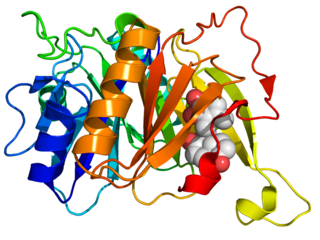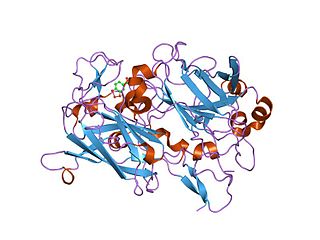Aromatic-ring-hydroxylating dioxygenases (ARHD) incorporate two atoms of dioxygen (O2) into their substrates in the dihydroxylation reaction. The product is (substituted) cis-1,2-dihydroxycyclohexadiene, which is subsequently converted to (substituted) benzene glycol by a cis-diol dehydrogenase.
An oxygenase is any enzyme that oxidizes a substrate by transferring the oxygen from molecular oxygen O2 (as in air) to it. The oxygenases form a class of oxidoreductases; their EC number is EC 1.13 or EC 1.14.

Catechol 1,2- dioxygenase is an enzyme that catalyzes the oxidative ring cleavage of catechol to form cis,cis-muconic acid:
In enzymology, a 4-sulfobenzoate 3,4-dioxygenase (EC 1.14.12.8) is an enzyme that catalyzes the chemical reaction
In enzymology, a biphenyl 2,3-dioxygenase (EC 1.14.12.18) is an enzyme that catalyzes the chemical reaction
In enzymology, a leucocyanidin oxygenase (EC 1.14.11.19) is an enzyme that catalyzes the chemical reaction
In enzymology, a 2,3-dihydroxybenzoate 2,3-dioxygenase (EC 1.13.11.28) is an enzyme that catalyzes the chemical reaction
In enzymology, a 2,3-dihydroxybenzoate 3,4-dioxygenase (EC 1.13.11.14) is an enzyme that catalyzes the chemical reaction
In enzymology, a 2,3-dihydroxyindole 2,3-dioxygenase (EC 1.13.11.23) is an enzyme that catalyzes the chemical reaction
In enzymology, a 3,4-dihydroxy-9,10-secoandrosta-1,3,5(10)-triene-9,17-dione 4,5-dioxygenase (EC 1.13.11.25) is an enzyme that catalyzes the chemical reaction
In enzymology, a 3,4-dihydroxyphenylacetate 2,3-dioxygenase (EC 1.13.11.15) is an enzyme that catalyzes the chemical reaction

3-hydroxyanthranilate 3,4-dioxygenase (EC 1.13.11.6) is an enzyme encoded by the HAAO gene that catalyzes the chemical reaction
Ascorbate 2,3-dioxygenase (EC 1.13.11.13) is an enzyme that catalyzes the chemical reaction

Biphenyl-2,3-diol 1,2-dioxygenase (EC 1.13.11.39) is an enzyme that catalyzes the chemical reaction
Chloridazon-catechol dioxygenase (EC 1.13.11.36) is an enzyme that catalyzes the chemical reaction
In enzymology, a gentisate 1,2-dioxygenase (EC 1.13.11.4) is an enzyme that catalyzes the chemical reaction
In enzymology, an indole 2,3-dioxygenase (EC 1.13.11.17) is an enzyme that catalyzes the chemical reaction
In enzymology, a peptide-tryptophan 2,3-dioxygenase (EC 1.13.11.26) is an enzyme that catalyzes the chemical reaction

In enzymology, a protocatechuate 3,4-dioxygenase (EC 1.13.11.3) is an enzyme that catalyzes the chemical reaction

Dioxygenases are oxidoreductase enzymes. Aerobic life, from simple single-celled bacteria species to complex eukaryotic organisms, has evolved to depend on the oxidizing power of dioxygen in various metabolic pathways. From energetic adenosine triphosphate (ATP) generation to xenobiotic degradation, the use of dioxygen as a biological oxidant is widespread and varied in the exact mechanism of its use. Enzymes employ many different schemes to use dioxygen, and this largely depends on the substrate and reaction at hand.






